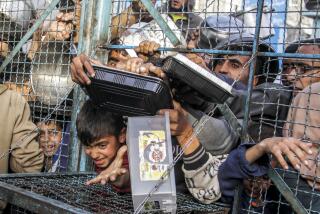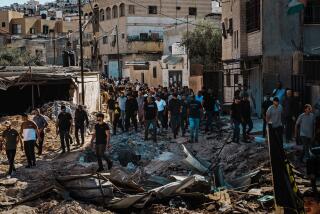Walls of Frustration Haven’t Tumbled in Jericho : Mideast: Many in the West Bank town are as unhappy with self-rule as they were with Israeli occupiers.
- Share via
JERICHO, West Bank — This is the summer of Jericho’s discontent.
Shaking off its reputation as a sleepy, sun-scorched desert oasis whose residents are concerned more with farming than with politics, Jericho has emerged as an unexpected focal point of unhappiness with the new Palestinian self-governing authority.
Earlier this month, Jericho merchants pulled down the steel doors that shutter their shops and joined a citywide protest against the Palestinian Authority.
It was the first such protest in the territories since the Palestinians began taking over government functions from the Israeli occupiers in May. Every few days, another protest rally is held by one faction or another with a new list of complaints about the authority.
Jericho residents also are bombarding Palestine Liberation Organization Chairman Yasser Arafat with petitions imploring him to visit Jericho and deal with its many problems.
They complain openly about Arafat’s decision to make his home in the Gaza Strip rather than the West Bank, his failure to spend more than a single day in Jericho and what they say is the incompetence of the Palestinian authorities who are supposed to be running their daily lives. They fret about the high profile of Palestinian police in the city and the tight limitations on self-rule.
“The people are always suffering,” said Mansour Salaima, head of the Jericho Chamber of Commerce. “They used to suffer before, when the Israelis were here, and they are still suffering now.
“There is a problem between the people and the authorities now,” Salaima said. “The people haven’t seen any changes since the Israelis left. The authority here is just a mediator, or a machine in the hands of the Israelis.”
Other West Bank Palestinians used to joke about the lack of enthusiasm among Jericho residents for the Palestinian uprising, or intifada , against Israel’s military rule of the occupied territories. Jericho’s 12,000 permanent residents didn’t hear about the intifada until seven months after it erupted, the other Palestinians would say. Activists scornfully referred to the town as “collaborator city,” an allusion to the good relations many Jerichoans maintained with the Israeli civil and military administration.
Jericho has always been a popular tourist stop, a town of graceful date palms and archeological sites that recall a history dating back 10,000 years. Trinket shops and fruit and vegetable stands still far outnumber portraits of Arafat in the town’s main square. Some of the restaurants that cater to tourists never bothered to close on designated strike days throughout the seven-year Palestinian revolt.
But Jericho’s profile began to change when Israel and the PLO agreed to begin the experiment with Palestinian self-governance in Gaza and Jericho.
Jericho was the symbolic toehold for the PLO in the West Bank. Its inclusion in the September, 1993, accord on self-rule in the territories was meant to reassure Palestinians that Israel wasn’t simply ceding Gaza to them but was promising eventual self-government in most of the territories that Israel captured in the 1967 Arab-Israeli War.
After Israel and the PLO signed the agreement, “every bastard in the West Bank opened an office in Jericho,” said a senior Israeli official who spoke on condition of anonymity. Suddenly, groups ranging from the Islamic fundamentalist organization Hamas to the former Communist Party rushed to establish a presence in Jericho. Various factions began holding rallies in the town, preparing for the Israeli troop withdrawal and hand-over of municipal functions.
Tensions were exacerbated, according to Palestinian analysts, when PLO officials and police officers from outside the territories began to converge on the town. Police officers, with no place to live and little pay, soon began imposing on local residents for lodging, food and other essentials. Friction developed between residents and the newcomers.
When the Israelis withdrew their troops from downtown Jericho in May, “they left behind nothing, administratively speaking,” said Saeb Erekat, minister of local government in the Palestinian Authority. The new administrators were left with problems ranging from a disintegrating water supply system to a shortage of housing for 300 freed Palestinian prisoners.
Erekat, a former member of the Palestinian peace negotiating team, is the most senior Palestinian civilian official based in Jericho.
“The people have a point” when they complain that life has not improved since the Palestinian Authority took over, Erekat conceded. But he blames most of the problems on a combination of Israeli lack of cooperation with the Palestinian Authority, the authority’s acute lack of funds and residents’ high expectations.
“When people come home and switch their lights on, they expect light. They get furious if they throw the switch and nothing happens; that’s normal,” Erekat said. “Texts of agreements mean nothing to the man on the street. The agreement is not Arafat and (Israeli Prime Minister Yitzhak) Rabin signing a piece of paper, it is changes on the ground, and people feeling these changes on the ground.”
Although Erekat speaks proudly of now having 24 municipal offices up and running in the freshly whitewashed former vocational school that is his headquarters, he says those offices have been able to do little yet that makes a difference in people’s lives.
Part of Erekat’s problem is that there is no clear line of authority in Jericho. He issues orders, but so does Maj. Gen. Hajj Ismail Jaber, the colonel in charge of what used to be the Palestine Liberation Army and is now the 1,000-strong Palestinian police force in town. There also are three separate intelligence services. There are joint Israeli-Palestinian police patrols through the city. Another joint committee is responsible for issuing permits, and Jerichoans say the bureaucratic tangle is nightmarish.
“We were expecting, with peace, we would be able to move freely,” said Tawfiq Nweiser, head of the Chamber of Commerce’s agricultural committee. “But now it takes much more time to move from Jericho to, say, Jerusalem. We must wait for permissions. Then we must wait at checkpoints. And sometimes we get turned back from checkpoints.”
Nweiser and other Jerichoans complain that they used to go to the Israeli civil administration to obtain such documents as birth certificates and permits allowing them to work in Israel. Now, they must apply to the Palestinian-Israeli joint committee. Documents that used to be processed in a matter of days often take a month or more, or simply disappear into the still-chaotic bureaucracy.
The answer, many Jerichoans insist, lies in getting Arafat to pay attention to their town and troubles.
“The people want Arafat to be in Jericho, to see the situation in Jericho. They want Arafat to hear their requests, to tell him personally about their problems. They don’t want a mediator,” Salaima said.
“We need months, probably years to convince people that we have a system now,” Erekat said. “They think that if they don’t meet Arafat, they’re not important. They want the chance to complain to him about us.”
Erekat indicated that he thinks it might be a good idea for Arafat, who visited Jericho for only four hours after choosing to base his operations in Gaza, to visit soon.
“Jericho is ignored, which means the West Bank is ignored,” Erekat said. “The people want to see their leader.”
“I have met with Arafat, I have asked him to come to Jericho,” Nweiser said. “He always says: ‘ Inshallah (God willing) I will come. Soon.’ ”
More to Read
Sign up for Essential California
The most important California stories and recommendations in your inbox every morning.
You may occasionally receive promotional content from the Los Angeles Times.













